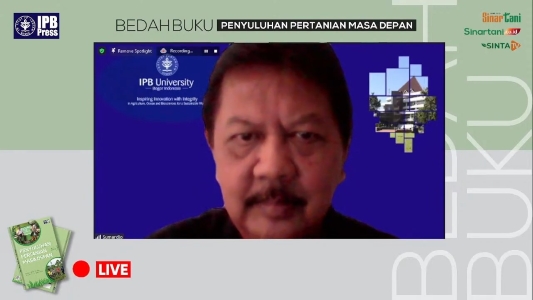Prof Sumardjo: Future Agricultural Extension Must Develop Community Participation and Independence

Professor of the Faculty of Human Ecology (Fema) IPB University, Prof Sumardjo revealed that agricultural extension in the future must be a driver of social transformation. According to him, agricultural extension is not just an effort to convey development messages but, more importantly, to foster community participation and independence in development.
He conveyed this in the Sinar Tani Tabloid Book Review 'Future Agricultural Extension' written by him and other authors, namely Prof Bustanul Arifin, Professor of the University of Lampung, and Machmur MS, Head of the Board of Trustees of the Indonesian Agricultural Extension Association (Perhiptani).
"Participation in the form of change and innovation is inserted as a necessity. Independence is defined as being able to adapt anticipatorily, not reactively or apathetically. This counseling becomes important as a social transformation designed by the community itself. But there is convergence with national interests," he explained.
He said agricultural extension must also show the opportunity given to the community to participate appropriately and intensively.
"The development of information and communication technology (ICT) in the future is an important consideration. It is not perceived only as a process of illumination or giving explanations but rather as an educational process," he added.
In the future, he continued, counseling must focus on a strategic and independent environment that is not dominated by current conditions. It is structured, functional, independent, and strong at the sub-district and village levels.
"Here, the role of academics has great potential as an integrator in collaboration between private extension workers," he said.
He commented that future agricultural extension is not a charitable activity or free assistance on the basis of mercy that creates dependency. Due to the condition of the workforce, the number of agricultural extension workers is dwindling due to age. The role of private and independent extension workers is increasingly important in order to be able to support agricultural development and social transformation.
In the book, he also reveals the relationship between the types and processes of social transformation in peri-urban societies in the era of disruption. As well as a picture of the transformation of values and attitudes through community adaptation. (MW)(IAAS/MZS)



